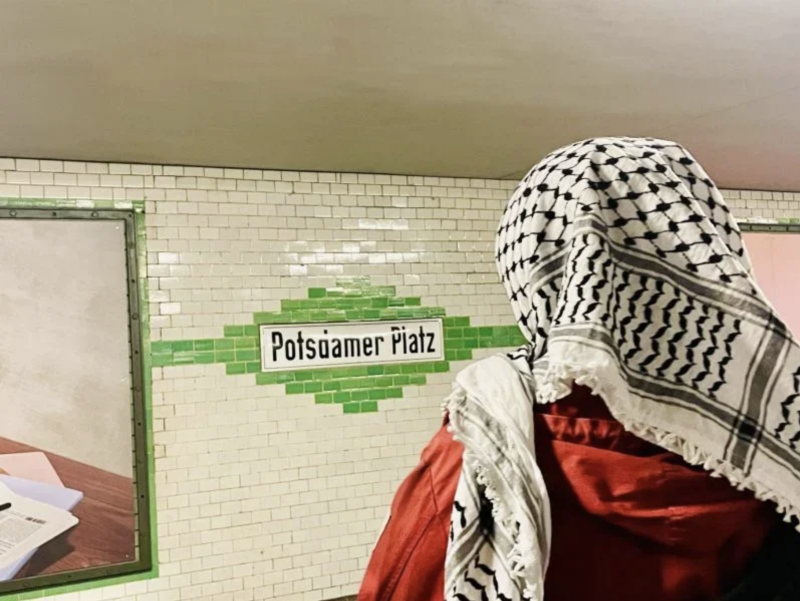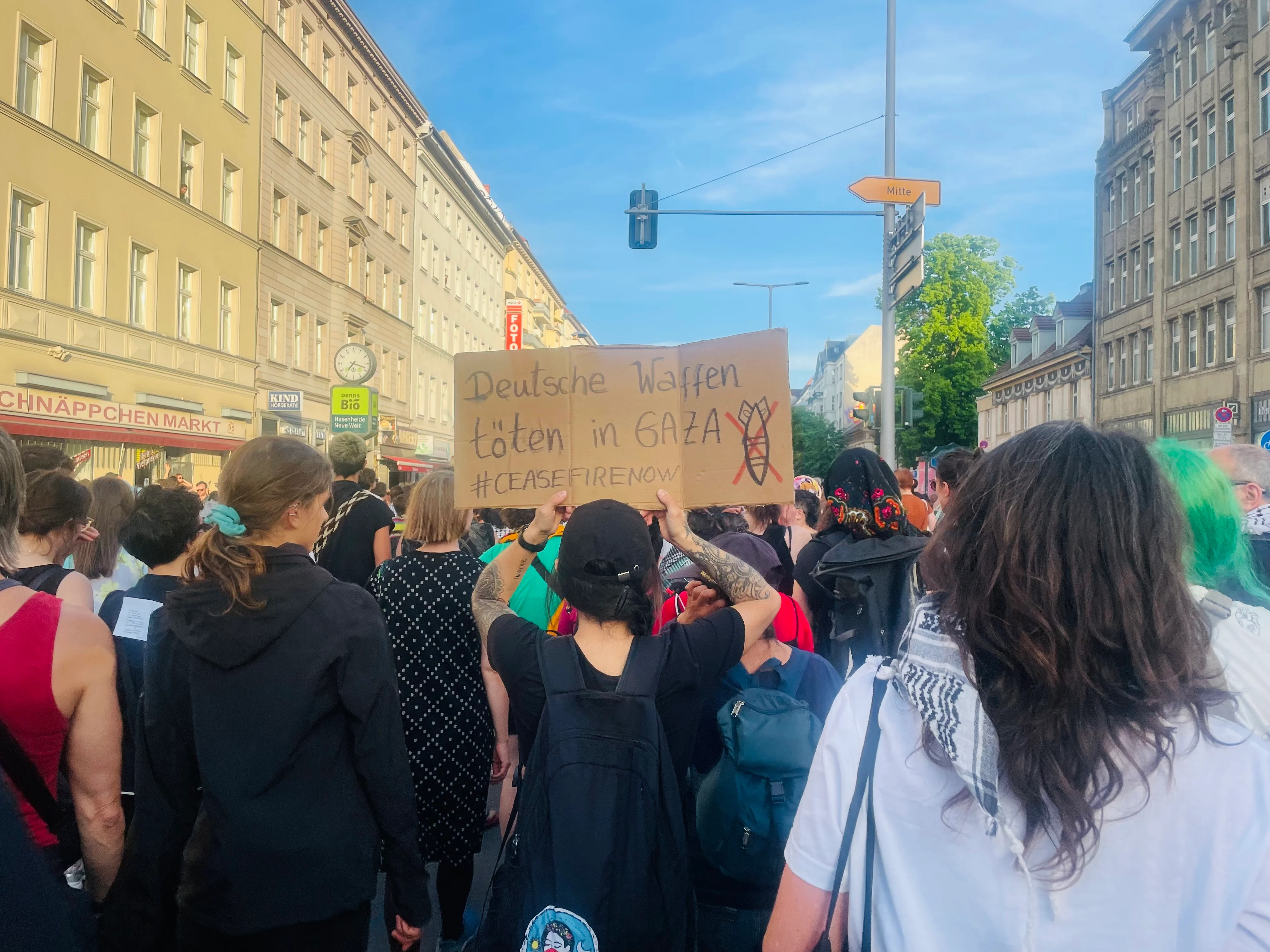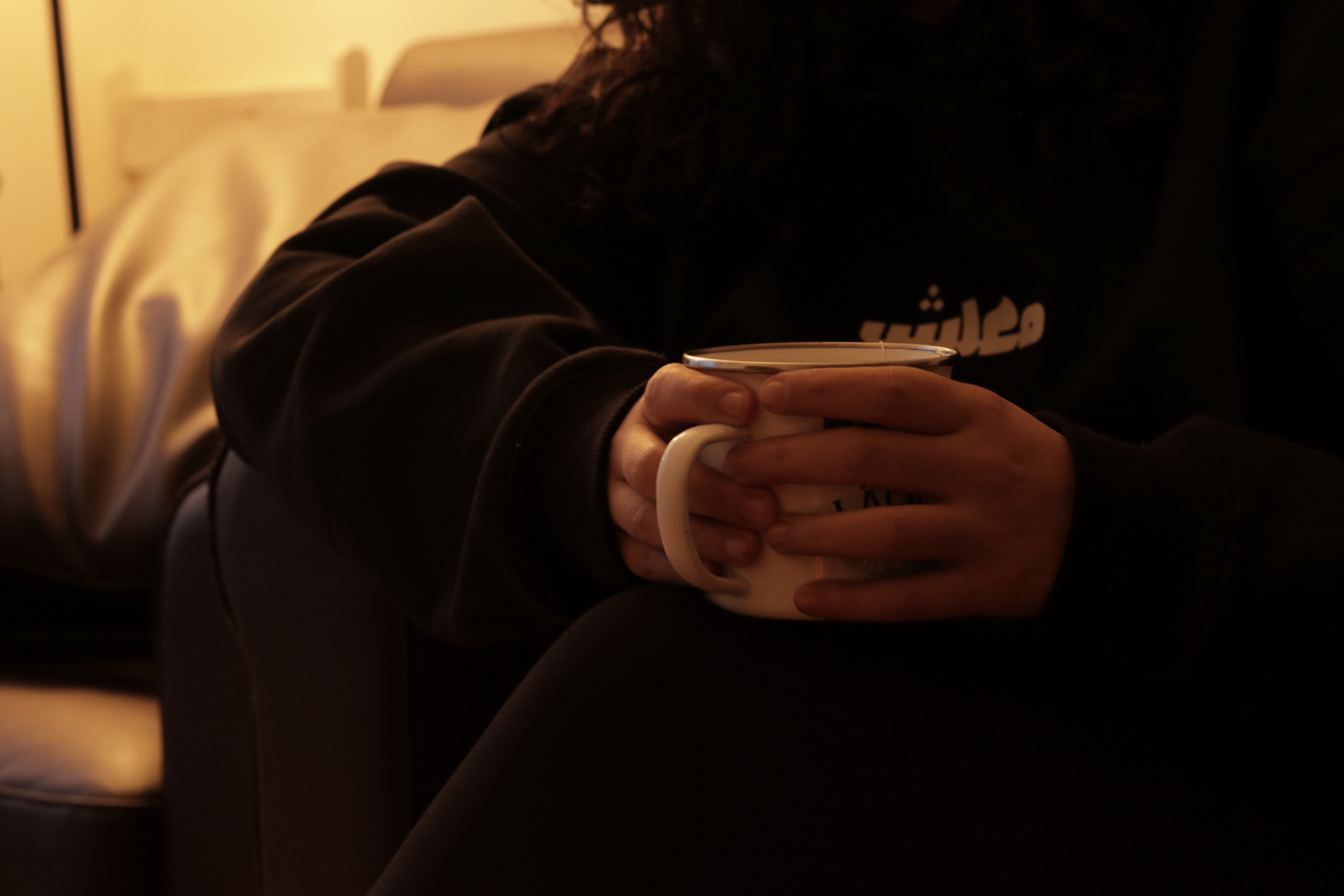
A woman, kuffiyeh on her head, in a subway station after a pro-Palestinian demonstration in Berlin, March 2, 2024. (Credit: Julie Kebbi)
For almost seven months, Dalal* has been meticulously reviewing her itinerary before leaving her house. “Where am I going? Which neighborhood? What for?” She asked herself.
Wrapped up to keep warm in Berlin’s winter, a kuffiyeh around her neck, she hesitated. “And then I convinced myself: Dalal, what are you afraid of?” said the 38-year-old Egyptian director.
For her, as for many Arabs living in Berlin, the face of the city has changed since Oct. 7, 2023. The authorities have been suppressing pro-Palestinian views, police raids and identity checks based on race in neighborhoods with large Arab populations.
According to all residents of the German capital who spoke to L’Orient-Le Jour, a climate of insecurity weighs heavily on racialized people.
“I haven’t felt such censorship since I moved to Berlin three years ago,” said Tarek*, a 26-year-old Lebanese engineer. Sitting in a cafe in the trendy Kreuzberg district, he paused momentarily to scan the area with his eyes.
“I'm aware that my residence permit could be withdrawn at any moment. So I’m being as discreet as possible: I don’t post anything on social media linked to Gaza, I don’t go to pro-Palestinian demonstrations and, above all, I don’t set foot in Sonnenallee [nicknamed Arab Street] anymore,” he whispered, for fear of being overheard at the neighboring tables.
‘Something promising’
In the colorful streets of the German capital, where urban art is the emblem of freedom of expression, the pro-Palestinian and pro-Israeli graffiti war set the tone. References to the genocide in Gaza or the Palestinian flag were quickly crossed out, blackened or erased. Posters calling for pro-Palestinian rallies are often torn down.
This atmosphere starkly contrasts the image of a country that, seen from abroad, was once considered the model pupil of the Welcome Culture or Willkommenskultur in Europe.
Less than 10 years ago, Angela Merkel’s Germany took the opposing view of its neighbors regarding the migration crisis, opening its borders to more than a million refugees who arrived through the Balkan route, mostly fleeing the war in Syria and the bloodthirsty regime of Bashar al-Assad.
 Pro-Palestinian and pro-Israeli graffiti on a Berlin street, March 6, 2024. (Credit: Julie Kebbi)
Pro-Palestinian and pro-Israeli graffiti on a Berlin street, March 6, 2024. (Credit: Julie Kebbi)
The younger generation that didn’t experience the artistic and intellectual effervescence of the Arab diasporas exiled in Europe in the 1970s saw the German capital then offer, and then not, what many had lost or never had: Rethinking and debating the Middle East free from the shackles of dictatorships.
“After the destruction of public political spaces in the Arab world, especially after the 2013 coup in Egypt, Berlin had something promising in comparison with other Western cities,” recalled Amro Ali, an Australian-Egyptian sociologist and author of the essay entitled On the Need to Shape the Arab Exile Body in Berlin**.
 A demonstrator holds up a sign reading "German weapons kill in Gaza" and calling for a cease-fire, May 1, 2024. (Credit: Julie Kebbi)
A demonstrator holds up a sign reading "German weapons kill in Gaza" and calling for a cease-fire, May 1, 2024. (Credit: Julie Kebbi)
Through its conferences, round-table discussions, plays and concerts, the city allows exiled youth to meet, share experiences and continue to fight for their rights from abroad. It’s a context where the Palestinian cause remains as central as it is sensitive, given that Germany is home to Europe’s largest Palestinian diaspora, estimated at 100,000 people, and that people of Arab origin make up 3.5 percent of Berlin’s population.
A perfect German speaker, Tala* attended university in Bavaria, before moving to the German capital in 2022. “At the time, Berlin represented everything that diversity meant to me. Until a few months ago, I had so many opportunities to discover and shape my identity. Now I can’t be the only version of myself that I want” she said.
“Today, I feel embarrassed when I hear the German politicians’ speeches,” said the 30-year-old Egyptian.
A difficult relationship
This is because, despite a death toll of over 34,500 according to Gaza’s health ministry, unwavering support for Israel is a pillar of Germany’s foreign policy.
In a speech to the Knesset in 2008, which German officials have widely repeated, then Chancellor Angela Merkel said that Israel’s security and right to exist are a “raison d’état” for Germany.
“When I first came to Berlin, I couldn’t understand why the Holocaust was such a taboo topic. But then I understood the weight of the guilt Germans feel towards the Jews, and how it affects their relationship with Israel,” said Rim*, a Syrian jurist.
While Berlin’s attitude is part of a historical continuum, the Oct.7 Hamas attack on Israel and the subsequent war in Gaza have exacerbated it. In a country scarred by its past, where anti-Semitism has been surging in recent years fueled by the far right, German Chancellor Olaf Scholz reaffirmed Berlin’s “responsibility” “in the wake of the Holocaust.” before the Bundestag in October
“The difficult relationship between German officials and Palestine has always been a balancing act,” said Ali. “But the fact that the masks are blatantly coming off is very worrying.”
Presented as a means of combating anti-Semitism and guaranteeing order and security in the German capital, the measures affecting freedom of expression have been taken one after the other since October.
“Previously, it was already complicated to find a venue or obtain funding to organize artistic events linked to Palestine, but Oct. 7 has made it possible to justify even more decisions,” said Maher*, a 28-year-old Palestinian student.
In November, the Berlin Senate Department for Culture suspended funding for cultural center Oyoun following the Mourning and Hope event by Jüdische Stimme für gerechten Frieden in Nahost (Jewish Voices for a Just Peace in the Middle East).
This decision provoked an outcry in the artistic world and on social media. A favorite gathering place for minorities and members of the LGBTQ+ community, this cultural institution “was one of the only places where, as migrants, we felt safe and could work or attend events on racism and colonialism,” said Nada*, a Lebanese student who has been based in Berlin since 2021.
‘It’s crazy that it’s come to this’
In the aftermath, numerous Jewish and Palestinian authors, researchers and artists, or those who have taken a stand against the genocide in Gaza, have had their events canceled across the country, and have been accused of anti-Semitism.
Broadcast live on social media by pro-Palestinian activists, an impressive police presence halted Palestine Congress in Berlin last month, while one of the guests, British-Palestinian surgeon Ghassan Abou Sitta, was denied entry to Germany at Brandenburg airport. His online intervention was also interrupted after just one minute when the authorities cut off the electricity supply to the conference building.
Others were even dismissed, like the Australian-Lebanese anthropologist Ghassan Hage, who was let go in February by the Max-Planck Institute following the publication of a text on his blog entitled Israel-Palestine: The Endless Dead-End That Will Not End.
“I had to block several colleagues on social media for fear that they would see my posts on Palestine and that this would have repercussions on my job,” said Tala. “Implicitly, we avoid raising the topic.”
 Demonstrators call for a ceasefire in Gaza during a rally in Berlin, Nov. 4, 2023. (Credit: Julie Kebbi)
Demonstrators call for a ceasefire in Gaza during a rally in Berlin, Nov. 4, 2023. (Credit: Julie Kebbi)
The same is true of students of Arab origin who are disappointed by the educational institutions’ attitude. While student initiatives denouncing genocide in Gaza are multiplying on university campuses in the USA and France, various events linked to the Palestinian cause have been banned at German universities across the country since October.
When they do take place, the organizers are often portrayed in the media as being pro-Hamas or anti-Semitic. “They were given the impression that this was an individual problem that they had to deal with on their own, which was particularly difficult for Palestinian students who feared for their families in Gaza and who cried every day on their way to class,” recalled Nada.
“It’s something many people here can’t understand: Waking up every morning without knowing whether war is going to explode in Lebanon or not,” she added.
For fear of the potential repercussions on his future, Maher decided to keep quiet and stop wearing his kuffiyeh at university. “It’s crazy that it’s come to this. University is a place where one is supposed to be able to exchange ideas, think and debate politics freely,” he said.
‘Dehumanizing’
In pro-Palestinian gatherings, police banned the “From the Sea to the Jordan” slogan. Berlin schools might prohibit the kuffiyeh and the distribution of leaflets entitled “The Myth of Israel 1948,” denying the Nakba in schools in Neukölln (a district with a large Arab community), etc. While restrictions are on the rise, it is above all the scale of the police presence and the increasing use of force by the authorities that is shocking.
According to Dalal, arbitrary arrests, aggressive policing and the use of tear gas at demonstrations bring back bad memories of the Arab Spring. “What, you mean you forgot to bring your vinegar and onion?” an exiled Egyptian friend once said, nicely mocking the young woman’s incredulity.
“I never imagined that, after three years on the streets of Egypt, I’d have to experience such violence again in another country, supposedly a democracy,” said Dalal.
“However, there’s an almost ridiculous aspect. The authorities don’t understand what most of the demonstrators went through — that most of them came here by boat and where they came from, the police fired at everyone with live ammunition,” she said.
“Every time I take to the street to protest, my father is scared to death for me,” said Rim, with a lump in her throat. “He begs me to keep quiet, but I can’t help it. What I saw on the streets of Berlin was so dehumanizing,” added the young woman, as she smoked cigarettes on the terrace of a cafe.
 Tala*, a young Egyptian living in Berlin, is now thinking of leaving Germany. (Credit: Julie Kebbi)
Tala*, a young Egyptian living in Berlin, is now thinking of leaving Germany. (Credit: Julie Kebbi)
Faced with difficult circumstances, many are now tempted to leave Berlin. They have the same question on their lips: “Where to? “I have the impression that, whatever we do, we’ll always be considered second-class citizens or terrorists,” said Tala, who now holds German nationality.
“However, Germany is now my second home and I know I won’t be going back to Egypt,” she added.
For others, choosing to stay is a matter of duty, a commitment to fight online and on the ground for the Palestinian cause. In recent months, there has been a noticeable change at the local level. According to a poll published in March by Infratest Dimap for public broadcaster ARD, 50 percent of Germans believe that Israel’s military operation in the Gaza Strip has gone too far — that is to say nine points more than in a similar poll conducted in November.
“I have to stay. There’s still a lot to do here,” said Maher, with a frank look in his eyes. “We’ve already left so much behind.”
*First names have been changed for security reasons.
**Published in Arab Berlin. Dynamics of Transformation, edited by Hanan Badr and Nahed Samour (Transcript, 2023).
This article was originally published in L'Orient-Le Jour. Translated by Joelle El Khoury.